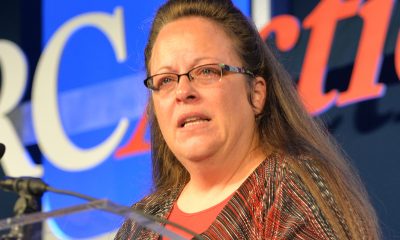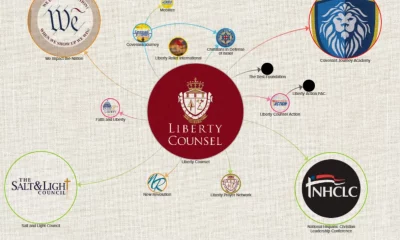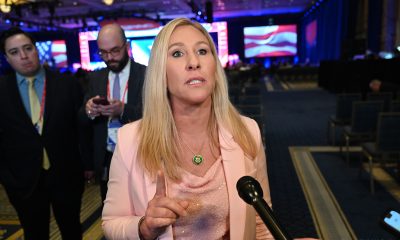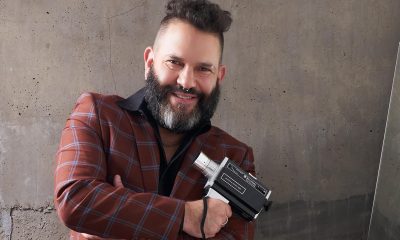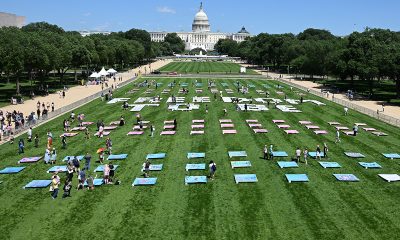Opinions
Creating Shame: Anti-Israel protest misguided, offensive
Task Force should revamp its conference, apologize to attendees
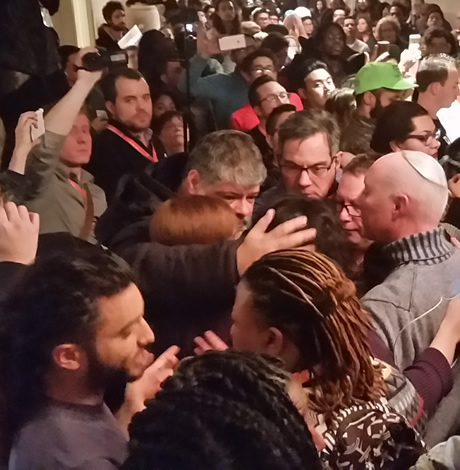
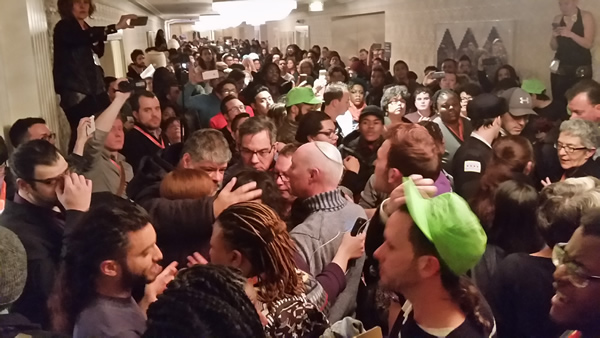
Protesters on Jan. 23, 2016, gather outside reception at the National LGBTQ Task Force’s annual Creating Change Conference in Chicago that was to have featured two LGBT rights advocates from Israel. (Photo courtesy of Andy Thayer/Gay Liberation Network)
While the East Coast was coping with this weekend’s blizzard, another storm was raging in Chicago at the site of the National LGBTQ Task Force’s annual Creating Change conference.
About 200 protesters forced the cancellation of a presentation by A Wider Bridge, an organization seeking to bolster “LGBTQ connections with Israel.” It was to have featured remarks from Sarah Kala-Meir and Tom Canning, leaders of Jerusalem Open House for Pride and Tolerance, an LGBT community center. Protesters held signs that read, “No pride in apartheid,” to draw attention to the Israeli government’s treatment of the Palestinians. They also spoke out against efforts to promote Israel’s LGBT rights record, which they regard as “pinkwashing,” or distracting attention from the plight of the Palestinians.
Kala-Meir, executive director of Jerusalem Open House, told the Blade that the protesters began shouting at her and Canning. She said they left the room through a back door. “We did not feel safe in that environment,” she added.
Tony Varona, associate dean for faculty and academic affairs at American University Washington College of Law, attended the event.
“The protestors stormed the doors, shut down the event, and basically blocked those of us who wanted to leave from exiting,” Varona wrote on Facebook. “I was able to squeeze past the crowd blocking the hallway and exit through a back doorway and stairwell but after only considerable effort and, frankly, what can only be described as harassment.” He also claims that Task Force staff watched helplessly from the sidelines as this sorry scene unfolded.
The ugly incident began last week when the Task Force initially cancelled the panel featuring A Wider Bridge after some LGBT critics accused Israel of engaging in “apartheid” and “pinkwashing.” Task Force Executive Director Rea Carey later reversed that decision and reinstated the presentation, after pro-Israeli critics pounced. That set the stage for what transpired Friday.
Staff from the Windy City Times posted videos to YouTube of the protest. Protesters can be heard chanting, “Palestine will be free from the river to the sea.”
It’s not clear whether they understood the context of what they were chanting or if they were merely caught up in the moment. That genocidal chant is an overt call for the destruction of Israel, from the Jordan River to the Mediterranean Sea. Arthur Slepian, executive director of A Wider Bridge, told the Windy City Times he felt there was “a strong undercurrent of anti-Semitism” at the protest.
There is so much wrong with what transpired that it’s difficult to know where to start.
The irony of one underrepresented group shouting down and harassing another is sickening to watch. If you want to promote understanding and “intersectionality” of causes, then you must listen to others and respect their views. Silencing those you dislike isn’t the answer. This sort of group-think creates a mob mentality in which dialogue is impossible.
The organizers of Creating Change had to know something like this was brewing. Yet they had no control over the protest, which easily could have devolved into a dangerous situation.
“The Task Force did very little to ensure that the program …could go on as planned, safely and without disruption,” Varona reported. “Instead, the protestors were allowed to bully the speakers off the stage, and then to bully and harass the attendees out of the room.”
When your invited speakers are forced to flee out a back door, you have failed in your responsibility to ensure the safety of attendees. Task Force staff must do a better job of providing security and of maintaining control over their own events. Ceding the stage to protesters sets an irresponsible precedent.
Perhaps the most regrettable outcome: Kala-Meir and Canning from JOH were silenced and mistreated. Two years ago, I traveled to Israel with a delegation of LGBT leaders from the United States (the trip was not sponsored by A Wider Bridge) and several of us spent an evening at JOH with Tom and others. They were kind and hospitable and even took us out to dinner and to a small gay bar after our meeting. There we saw the important work that JOH is doing, from providing HIV testing services to creating a safe space for Jews and Arabs alike to meet and socialize. Their work is changing lives, but they face grave obstacles. Just five months ago, an Orthodox Jewish man stabbed a 16-year-old girl to death and injured five others during an attack on a Jerusalem Pride march organized by JOH. Sarah, Tom and their colleagues bravely carry out their work amid threats of violence from extremists on both sides of the conflict. They are good people who deserved better from their U.S. hosts.
So why all the fuss targeting these fellow LGBT activists? The misguided protesters don’t like that A Wider Bridge partners with the Israeli government, “including its most violent, right-wing, racist elements — to promote media favorable to Israel,” according to Andy Thayer of the Gay Liberation Network. But this assessment ignores the good work of both groups.
“Even a cursory look into the organizations’ respective missions, alliances, donors, and activities will show that they are far from puppets of the Israeli government, are expressly pro-Palestinian in their positions, and both serve and include LGBTQ Palestinians in their work,” Varona rightly observed.
And would it be better if Israel treated its LGBT citizens like its neighbors in Egypt or Saudi Arabia or Syria? There’s a lot to criticize in the Israeli government these days, but its treatment of LGBT people isn’t among the problems. Israeli Prime Minister Benjamin Netanyahu’s provocative policy of building new Jewish settlements has helped derail peace efforts. He has openly opposed a two-state solution. Progress will only come after he leaves office.
I have been to Ramallah and to the edge of the Gaza Strip and even met with a Palestinian negotiator. Life for hard-working Palestinians is undeniably difficult. Many can’t get to work without navigating long lines at dehumanizing checkpoints. This situation should not be allowed to persist and we are right to protest Netanyahu’s tactics that undermine peace.
But things aren’t much better on the other side. Palestinian leader Mahmoud Abbas was elected president in 2005, but his term expired seven years ago. How can Israel negotiate a peace agreement with a partner who isn’t empowered to implement terms of a deal? The leadership vacuum has emboldened Hamas, which has further destabilized the region. The Israeli towns that border the Gaza Strip endure regular — sometimes daily — rocket attacks. There are bomb shelters on every street corner and residents all suffer some form of PTSD.
These problems are entrenched and complicated and have bedeviled every American president for decades. It’s unfortunate they were reduced to such simplistic terms by LGBT protesters in Chicago who seemed to call for the destruction of Israel. If that wasn’t their intent, then they should educate themselves and clarify their demands. Regardless, the good people of JOH didn’t deserve to be demonized in this way. Protest organizers and the Task Force owe them an apology.
And it’s time for a thorough rethinking of Creating Change itself. It’s a long-running, important conference for grassroots LGBT activists, many of whom feel disconnected from the marriage-dominated movement of the Human Rights Campaign. I have attended Creating Change many times and served on panel discussions for several years. It’s refreshing to meet with younger LGBT advocates and Creating Change provides a safe space for them to share ideas and tactics.
But “safe spaces” should refer to protecting the physical safety of attendees. They should not be shielded from opinions and ideas they find offensive. The LGBT movement has much work ahead, from protecting hard-fought victories of recent years to combating stubbornly high rates of HIV infection to ending youth homelessness. Censoring speech and shouting down those we disagree with should not be on our agenda. Creating Change organizers must behave like the parent in the room and establish some basic rules of engagement and enforce them. And there’s clearly much work to be done in educating younger advocates on the history of Israel, the Holocaust and the plight of LGBT people in the Middle East.
Here’s hoping the Task Force can turn the ugly, unfortunate events of last weekend into a teachable moment that fosters understanding.
Kevin Naff is editor of the Washington Blade. Reach him at [email protected].
Commentary
Second ‘lavender scare’ is harming our veterans. We know how to fix it
Out in National Security has built Trans Veterans State and Local Policy Toolkit

Seventy years after the first “lavender scare” drove LGBTQ Americans from public service, a second version is taking shape. Executive directives and administrative reviews have targeted transgender servicemembers and veterans, producing a new wave of quiet separations and lost benefits.
The policy language is technical, but the result is personal. Veterans who served honorably now face disrupted healthcare, delayed credentials, or housing barriers that no act of Congress ever required. Once again, Americans who met every standard of service are being told that their identity disqualifies them from stability.
Out in National Security built the Trans Veterans State and Local Policy Toolkit to change that. The toolkit gives state and local governments a practical path to repair harm through three measurable actions.
First, continuity of care. States can keep veterans covered by adopting presumptive Medicaid eligibility, aligning timelines with VA enrollment, and training providers in evidence-based gender-affirming care following the World Professional Association for Transgender Health Standards of Care Version 8.
Second, employment, and licensing. Governors and boards can recognize Department of Defense credentials, expedite licensing under existing reciprocity compacts, and ensure nondiscrimination in state veterans’ employment statutes.
Third, housing stability. States can designate transgender-veteran housing liaisons, expand voucher access, and enforce fair-housing protections that already exist in law.
Each step can be taken administratively within 90 days and requires no new federal legislation. The goal is straightforward: small, state-level reforms that yield rapid, measurable improvement in veterans’ daily lives.
The toolkit was introduced during a Veterans Week event hosted by the Center for American Progress, where federal and state leaders joined Out in National Security to highlight the first wave of state agencies adopting its recommendations. The discussion underscored how targeted, administrative reforms can strengthen veterans’ healthcare, employment, and housing outcomes without new legislation. Full materials and implementation resources are now available at outinnationalsecurity.org/public-policy/toolkit, developed in partnership with Minority Veterans of America, the Modern Military Association of America, SPARTA Pride, and the Human Rights Campaign.
These are technical fixes, but they carry moral weight. They reaffirm a basic democratic promise: service earns respect, not suspicion.
As a policy professional who has worked with veterans across the country, I see this moment as a test of civic integrity. The measure of a democracy is not only who it allows to serve but how it treats them afterward.
The second “lavender scare” will end when institutions at every level decide that inclusion is an obligation, not an exception. The toolkit offers a way to begin.
For more information or to access the toolkit once it is public, visit outinnationalsecurity.org/toolkit.
Lucas F. Schleusener is the CEO of Out in National Security.

For years, the far right has relied on a familiar infrastructure to wage its political battles: coordinated legal networks, back-channeled money, and an ever-growing pipeline of model legislation that moves quietly from one statehouse to another. What used to be a fringe ecosystem of activist lawyers has matured into something far more muscular. Today, the attacks on LGBTQ Americans—especially transgender people—are not random. They are designed, drafted, and deployed by a disciplined constellation of groups that understand how to move legislation with precision. And if Democrats, civil rights advocates, and national LGBTQ organizations continue treating each bill as an isolated outrage rather than a unified offensive, this machine will keep outpacing them.
Most Americans have never heard of outfits like the Alliance Defending Freedom, the American Principles Project, the Leadership Institute’s law arm, or the network of state-based policy shops that orbit the Heritage Foundation. But these entities now function as the shadow authors of state legislation. The anti-trans sports bans that appeared in more than 20 states did not arise organically; they were cloned from drafts circulated by ADF attorneys. The same is true for bills restricting gender-affirming care, limiting name and pronoun accommodations in schools, or expanding “religious liberty” carve-outs that allow discrimination against LGBTQ employees or customers. Legislators often change a few words, swap in a local sponsor, and reintroduce the same provisions session after session — giving the impression of momentum when, in reality, only a handful of ideologues are writing the nation’s culture-war script.
The operational model is simple: produce a bill, partner with a state-level think tank, recruit a legislator to introduce it, and provide legal testimony to defend it. But the strategic sophistication lies upstream. These groups have spent years cultivating relationships with attorneys general, state solicitors, and conservative judges who are sympathetic to their worldview. They draft legislation with litigation in mind, anticipating which language will survive scrutiny before the federal courts they have worked diligently to remake. They treat policy, politics, and jurisprudence as a seamless ecosystem; meanwhile, LGBTQ advocates are forced to fight on three fronts at once, often with smaller budgets and no comparable network of state-by-state affiliates.
What is most striking now is the acceleration. Bills that used to be test-driven in one or two states are being introduced in a dozen simultaneously. After the Supreme Court’s Dobbs decision, the same legal strategists pushing abortion bans pivoted almost immediately toward restricting trans health care, framing puberty blockers and hormone therapy as “sterilization.” The rhetorical shift was not accidental. It was a deliberate legal construction designed to open the door to future Fourteenth Amendment challenges, should the movement secure a case capable of reaching the Supreme Court. This is not simply a legislative fight; it is the groundwork for long-term judicial warfare.
And yet, Democrats and even national LGBTQ groups often treat these measures as if they were spontaneous outbursts of local prejudice. That is politically naïve. The reason similar bills appear in Idaho, Florida, Tennessee, Kansas, and Ohio at the same time is because they originate from the same set of PDFs stored on the same servers belonging to the same legal networks. The far right has embraced an industrial model of anti-LGBTQ policymaking: mass production, rapid deployment, and coordinated amplification by media channels that echo the same talking points across state lines.
The consequence is that the burden falls on queer people themselves—especially trans people—to respond to an avalanche of bills, hearings, lawsuits, and administrative changes that no individual or small advocacy team can fully track. When you have a network of attorneys feeding language to legislators, drafting amicus briefs, and preparing future litigation strategies in advance, you create an asymmetry that is difficult to counter with reactive press releases or one-off legal challenges. This imbalance of power is not about public opinion, which still supports LGBTQ equality by wide margins. It is about institutional positioning. The far right has placed its lawyers where the pressure points are: in state AG offices, in coordinated legislative caucuses, in judicial clerkships, and in the nonprofit legal trenches where issue fights are shaped long before the public hears about them.
There is a path forward, but it requires abandoning the old model of treating each bill as a separate emergency. LGBTQ organizations need a unified, long-range strategy that mirrors the discipline of the groups attacking them. That means state-by-state legal surveillance, rapid drafting of counter-model legislation, formal partnerships with progressive state AGs, and a standing litigation coalition capable of anticipating—not just responding to—legal threats. It also means investing in local leaders who understand that these bills are symptoms of a national machine, not quirks of their hometown politics.
What’s at stake here is nothing less than the architecture of civil rights in the United States. The far right is attempting to rewrite the legal landscape through volume and repetition, hoping courts will eventually treat these contrived bills as reflections of a shifting national consensus. They are betting that if they introduce enough legislation, in enough states, for enough years, the judiciary will reinterpret LGBTQ equality not as a settled constitutional principle but as a contested social question that can be narrowed or rolled back. Their ultimate goal is not just to restrict trans rights today but to lay the doctrinal groundwork for limiting LGBTQ protections for a generation.
The community can still win this fight, but only if it sees the battlefield clearly. These bills are not local skirmishes—they are coordinated acts of legal engineering. And it is time the pro-equality movement built an equally coordinated system to match them.
Isaac Amend is a writer based in the D.C. area. He is a transgender man and was featured in National Geographic’s ‘Gender Revolution’ documentary. He serves on the board of the LGBT Democrats of Virginia. Contact him on Instagram at @isaacamend
Opinions
Everything is Everything
Transformer’s 21st Annual Benefit Art Auction & Gala at the LINE DC November 19, 2025

In Washington, DC, art has never existed in isolation—it thrives where people gather and create. Art isn’t an accessory to the city’s identity—it’s foundational to it. This city was designed by artists, built by craftsmen, and has been continuously shaped by creative vision for more than two centuries. While other American cities grew organically around commerce or geography, Washington was imagined first, drawn by hand, and constructed as a deliberate artistic expression of democratic ideals. The result is a living gallery where public art doesn’t just reflect our history; it actively shapes how we understand citizenship, memory, and identity.
For 23 years, Transformer has been a cornerstone of DC’s contemporary art scene, committed to uplifting emerging and underrepresented artists who challenge boundaries and engage audiences with new experimental artistic concepts. On November 22, 2025, Transformer will host Everything is Everything, our 21st Annual Benefit Art Auction & Gala at the LINE DC, a night dedicated to celebrating the power of connection through art, performance, and community.
Everything is Everything is an extension of our non-profit organization’s cutting-edge vision, bringing together artists across different mediums, aesthetics, and walks of life. This philosophy embraces interconnectedness: where art, identity, and community are a part of the same living fabric. The gala brings together hundreds of people to celebrate art & artists, featuring over 140+ artworks in a public exhibition available for silent bidding. Guests also enjoy our innovative Artist Activated Experiences Lounge, featuring immersive installations by DC based queer artists Bumper, Katie Magician, Div0id, JaxKnife Complex, Stitches DC, Hennessey and Kunj.
In a time when queer and drag performers face renewed cultural and legislative attacks, Everything is Everything affirms that freedom of expression is not optional—it’s essential. Our “Celebration of DC Club Kids” pays tribute to DC’s legendary Club Kids and nightlife culture—those radiant spaces that have long nurtured queer creativity, self-expression, and freedom. Produced at the Gala in collaboration with queer artist collective haus of bambi, this performance honors our city’s history while celebrating the diversity and creativity that will continue to shape its future. Everything is Everything culminates in a show-stopping performance by iconic New York City based performance artist, cabaret singer, and drag artist Joey Arias.
As Transformer’s Everything is Everything Gala Committee, we’ve experienced firsthand how artists in DC transform spaces, challenge norms, and build community. The Gala is a celebration of that creativity and resilience. It is also a crucial act of support: proceeds from the Everything is Everything Benefit Art Auction & Gala directly supports artists while sustaining Transformer’s year-round exhibitions and programs that elevate emerging artists and arts leaders within DC and beyond. In doing so, Everything is Everything ensures that experimental and inclusive artistic practice, particularly of queer, trans, and BIPOC artists, continues to thrive.
Because in DC, art isn’t just something we look at—it’s something we live, share, and fight to protect.
Purchase tickets to Everything is Everything, Transformer’s Annual Benefit Art Auction & Gala at onecau.se/everythingiseverything. Learn more about Transformer’s mission at www.transformerdc.org.
- Transformer’s Everything is Everything Gala Committee: Allana D’Amico, Sondra Fein, Theresa Nielson, Jennifer Sakai, Christopher Addison, Monica Alford, Samantha Dean, Samira Farmer, Carole Feld, Celina Gerbic, Ally Helmers, Allison Marvin, Marissa McBride, Tom Noll, Crystal Patterson, Victoria Reis, Dorothy Stein, Emily Strulson, Gregg Tourville, José Alberto Uclés, and Hanna Thompson



